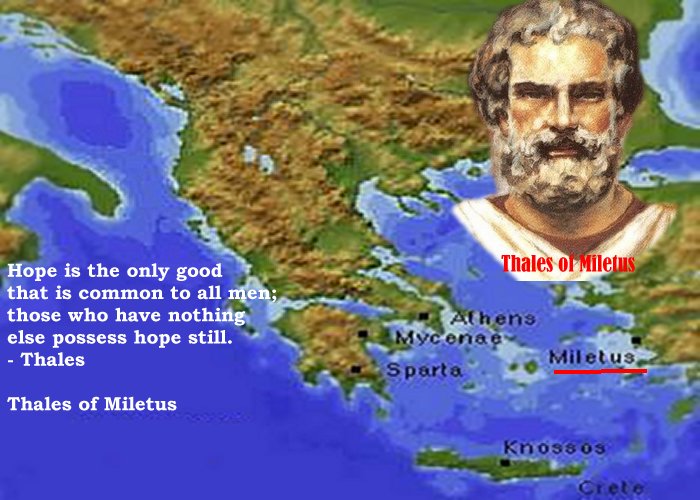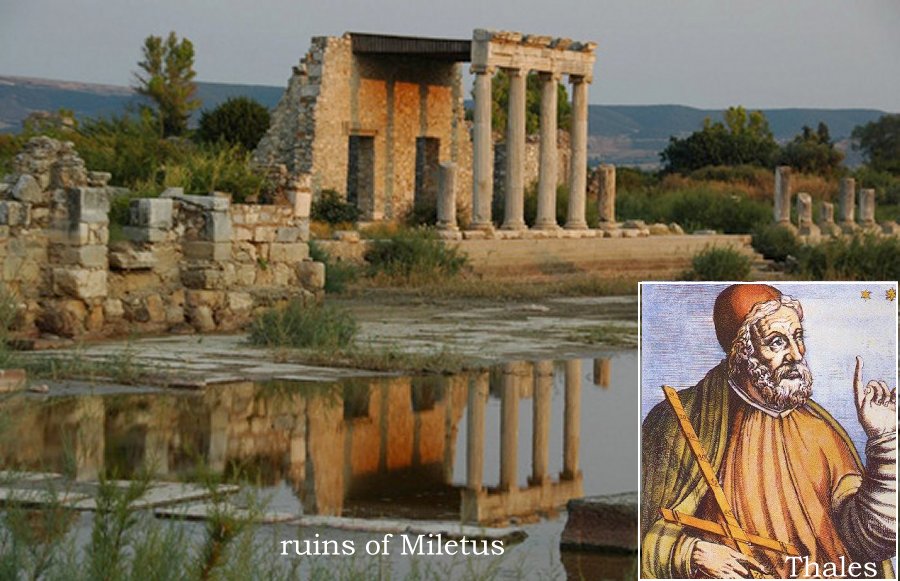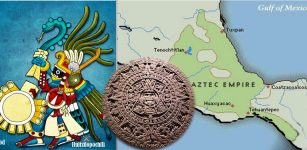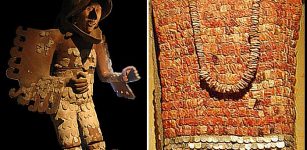Thales Of Miletus: One Of The Famous “Seven Sages Of Greece” Who Predicted A Solar Eclipse
A. Sutherland - AncientPages.com - Thales of Miletus is counted among the seven sages of ancient Greece. He is considered the father of Greek mathematics, as well as the first European scholar and philosopher.
Many theorems in geometry are attributed to him, including the so-called ‘theorem of Thales’. Thales was described by Aristotle (384–322 BC) one of the greatest philosophers of all time, as the founder of the Ionic Philosophy, and so the founder of Greek Philosophy as a whole.

He is renowned for correctly predicting a solar eclipse, figuring out how to measure the height of the pyramids in Egypt, calculating the real length of a solar year to a high degree of accuracy, and also for many other achievements in fields of philosophy, mathematics, and engineering.
He marked the beginning of one the oldest and finest philosophy - the Greek Philosophy.
The Ionic School was represented by pre-Socratic group of Greek philosophers of the 6th and 5th century BC; most of them were born in Ionia, an ancient region of central coastal Anatolia in present-day Turkey, the region nearest İzmir, which was historically Smyrna. These philosophers focused their minds on the beginnings of the universe, the forces which shaped it and the materials of which it is composed.
Thales believed that "all things were full of gods" and called the soul the principle of movement. He believed in the immortality of the soul. He observed things, thought about them intensely and used his tool of reasoning to explain many things.
Thales lived in the city of Miletus, which is current day Milet in Turkey), and was highly respected across Asia Minor. His extensive knowledge of astronomy indicates that he was educated at some point in Egypt or Babylon, the major centers of education.

With no apparatus, Thales was able to state that earth floated in water. He was able to predict solar eclipses. It was Thales who began to put an end to the false belief that earth was flat. According to Aristotle, Thales believed that earth was spherical.
For a certain period of time, he lived at the court of the King of Lydia, and it was during a battle between Lydia and Medes in 585 BC, that he famously predicted an eclipse of the sun on eve of great battle.
The phenomenon passed over the battle field and gave a strong uncanny sensation of approaching disaster. The combatants saw the eclipse as disapproval of their warfare, and as a warning, they felt great fear and anxiety They ceased fighting and a peace agreement was reached between the two kings.
The prediction of a solar eclipse by Thales was one of the most remarkable events, which was widely celebrated among Thales’ contemporaries and it has surprised modern scholars as well. However, there are no ancient accounts that explain his great achievement and modern attempts to reconstruct Thales’ approach to the phenomenon – unfortunately failed.
Moreover, it has long been argued that any reliable prediction of a solar eclipse was impossible before Hipparchus of Nicea (190 BC - 120 BC), an ancient Greek mathematician, astronomer and geographer, regarded by many historians as the greatest astronomical genius among the ancient Greeks.
The fact remains that the eclipse did occur within the period Thales accurately specified. How Thales foretold the eclipse is not known.
Modern astronomy confirms that the eclipse did occur, and was total.
Thales is also well-known for figuring out how to measure the height of the pyramids in Egypt, how to calculate the real length of a solar year to a high degree of accuracy, and many other achievements in fields of philosophy, mathematics, and engineering.
Written by – A. Sutherland - AncientPages.com Senior Staff Writer
Copyright © AncientPages.com All rights reserved. This material may not be published, broadcast, rewritten or redistributed in whole or part without the express written permission of AncientPages.com
Expand for referencesMore From Ancient Pages
-
 Viking Ship Found With Unexpected Goods For Unclear Purpose Puzzles Scientists
Vikings | Nov 24, 2024
Viking Ship Found With Unexpected Goods For Unclear Purpose Puzzles Scientists
Vikings | Nov 24, 2024 -
 Why The Aztecs Called Themselves ‘Mexica’
Ancient History Facts | Jan 13, 2018
Why The Aztecs Called Themselves ‘Mexica’
Ancient History Facts | Jan 13, 2018 -
 2,000-Year-Old Lavatory In Turkey’s Denizli Province Will Be Restored
Archaeology | Aug 4, 2020
2,000-Year-Old Lavatory In Turkey’s Denizli Province Will Be Restored
Archaeology | Aug 4, 2020 -
 Unique Ancient Three-Headed Eagle Pendant Discovered In Finland: A Symbol Of Three Different Human Souls
Ancient Symbols | May 6, 2016
Unique Ancient Three-Headed Eagle Pendant Discovered In Finland: A Symbol Of Three Different Human Souls
Ancient Symbols | May 6, 2016 -
 ‘Arcade’ Of Ancient Mancala Game Boards Carved On Rocks Found In Lewa Wildlife Conservancy, Kenya
Archaeology | Feb 2, 2024
‘Arcade’ Of Ancient Mancala Game Boards Carved On Rocks Found In Lewa Wildlife Conservancy, Kenya
Archaeology | Feb 2, 2024 -
 2,000-Year-Old Stela And ‘Laboratory’ Of Early Maya Writing Found In Guatemala
Archaeology | Mar 15, 2020
2,000-Year-Old Stela And ‘Laboratory’ Of Early Maya Writing Found In Guatemala
Archaeology | Mar 15, 2020 -
 Unique Viking Age Shipyard Discovered At Birka Challenges Maritime Activities Of The Viking Age
Archaeology | Jun 16, 2022
Unique Viking Age Shipyard Discovered At Birka Challenges Maritime Activities Of The Viking Age
Archaeology | Jun 16, 2022 -
 Mysterious Ancient Site Of Çatalhöyük: Remains Of Early Structures May Shed More Light On Its Obscure Past
Archaeology | Apr 11, 2017
Mysterious Ancient Site Of Çatalhöyük: Remains Of Early Structures May Shed More Light On Its Obscure Past
Archaeology | Apr 11, 2017 -
 What Was It Like To Be A Student In The Middle Ages?
Ancient History Facts | Jun 6, 2019
What Was It Like To Be A Student In The Middle Ages?
Ancient History Facts | Jun 6, 2019 -
 Ancient City Of Troy Was Destroyed By An Earthquake That Ended The Trojan War – Archaeologists Say
Archaeology | Jun 14, 2017
Ancient City Of Troy Was Destroyed By An Earthquake That Ended The Trojan War – Archaeologists Say
Archaeology | Jun 14, 2017 -
 Viking Grave And Sword Discovered In Norwegian Garden
Archaeology | Jul 3, 2023
Viking Grave And Sword Discovered In Norwegian Garden
Archaeology | Jul 3, 2023 -
 Kunlun Mountain – Mythical Dwelling Place Of Gods, Sacred Animals And Symbol Of Axis Mundi In Chinese Mythology
Chinese Mythology | Jan 31, 2019
Kunlun Mountain – Mythical Dwelling Place Of Gods, Sacred Animals And Symbol Of Axis Mundi In Chinese Mythology
Chinese Mythology | Jan 31, 2019 -
 Fearsome Aztec Eagle And Jaguar Warriors Of Mesoamerica
Featured Stories | Sep 14, 2023
Fearsome Aztec Eagle And Jaguar Warriors Of Mesoamerica
Featured Stories | Sep 14, 2023 -
 Amulets, Figurines Discovered In Recently Unearthed Limestone Sarcophagus In Minya, Egypt
Archaeology | Oct 15, 2020
Amulets, Figurines Discovered In Recently Unearthed Limestone Sarcophagus In Minya, Egypt
Archaeology | Oct 15, 2020 -
 On This Day In History: Antarctic Explorer Lawrence “Titus” Oates Born – On Mar 17, 1880
News | Mar 17, 2017
On This Day In History: Antarctic Explorer Lawrence “Titus” Oates Born – On Mar 17, 1880
News | Mar 17, 2017 -
 Simon Magus ‘The Magician’ Who Faked Death And Resurrection
Featured Stories | Feb 17, 2022
Simon Magus ‘The Magician’ Who Faked Death And Resurrection
Featured Stories | Feb 17, 2022 -
 Clues What Tiggered Climate Change 8,000 Years Ago Found In Scotland
News | Sep 15, 2023
Clues What Tiggered Climate Change 8,000 Years Ago Found In Scotland
News | Sep 15, 2023 -
 Mystery Of The Patagonian Giants: Europe’s Lost Race From The ‘Land Of The Bigfeet’
Featured Stories | Jun 20, 2020
Mystery Of The Patagonian Giants: Europe’s Lost Race From The ‘Land Of The Bigfeet’
Featured Stories | Jun 20, 2020 -
 Ceibal Is The Oldest Known Ceremonial Site Of The Maya Civilization
Ancient History Facts | Oct 1, 2016
Ceibal Is The Oldest Known Ceremonial Site Of The Maya Civilization
Ancient History Facts | Oct 1, 2016 -
 Sacred Medicine Bundle With Relics Of The First Ancestors Or Given By The Gods
Ancient Traditions And Customs | Sep 15, 2016
Sacred Medicine Bundle With Relics Of The First Ancestors Or Given By The Gods
Ancient Traditions And Customs | Sep 15, 2016
